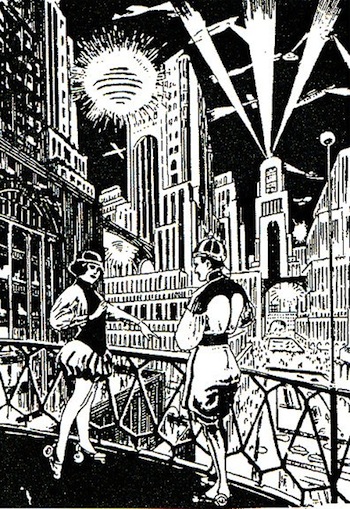Science Fiction
Dictionary
A B C D E F G H I J K L M N O P Q R S T U V W X Y Z
Robotic Roller Skate Micro-Mobility

The idea of powered robotic roller skates has been an attractive idea for at least a century. These unit-type micro-mobility prototypes were demonstrated by Toshinobu Takei of Japanís National Institute of Advanced Industrial Science and Technology at the 2009 International Robot Exhibition in Tokyo.
(Unit-type micro-mobility robotic roller skate video)
They could frankly be a bit zippier; the powered roller skates can only manage an anemic 4 km per hour (try the in-line Motosk8 with a two-stroke gas motor for more power). They move when you grasp the poles and lean forward. Apparently, they're based on "takeuma", which are simple bamboo stilts that kids play with in Japan.
Hugo Gernsback loved the idea of powered roller skates. In the advanced world of his 1911 novel Ralph 124c 41 +, everyone loved them. And no wonder; just take a look at the lovely young woman and the dashing young man in an original illustration reproduced below.
...Ralph bade Alice sit down on a chair in the vestibule. He pressed a nearby button twice and a servant brought two pairs of what appeared to be roller-skates.In reality they were Tele-motor-coasters. They were made of alomagnesium and each weighed only about one and a half pounds. Each had three small, rubber-covered wheels, one in front and two in the rear. Between the wheels was a small electric motor - about the size of a lemon; this motor could only be operated by high frequency currents and, despite its small size, could deliver about one-quarter horsepower...
(Read more about tele-motor-coasters)
Here's a graphic image by Frank R. Paul from the publication of the novel in Amazing Stories Quarterly (1929).

Via Botropolis.
Scroll down for more stories in the same category. (Story submitted 12/2/2009)
Follow this kind of news @Technovelgy.| Email | RSS | Blog It | Stumble | del.icio.us | Digg | Reddit |
Would
you like to contribute a story tip?
It's easy:
Get the URL of the story, and the related sf author, and add
it here.
Comment/Join discussion ( 2 )
Related News Stories - (" Transportation ")
Boring Company Drills Asimov's Single Vehicle Tunnels
'It was riddled with holes that were the mouths of tunnels.' - Isaac Asimov, 1951
Boring Company Vegas Loop Like Asimov Said
'There was a wall ahead... It was riddled with holes that were the mouths of tunnels.' Isaac Asimov, 1951.
SpaceX Rocket Shuttle Point-To-Point On Earth
'He came to as the ship went into free flight, arching in a high parabola over the plains...' - Robert Heinlein, 1951.
CORLEO Robotic Horse Concept Looks Ready To Ride
Imagine digging your heels in to a steam horse!
Technovelgy (that's tech-novel-gee!) is devoted to the creative science inventions and ideas of sf authors. Look for the Invention Category that interests you, the Glossary, the Invention Timeline, or see what's New.
Science Fiction
Timeline
1600-1899
1900-1939
1940's 1950's
1960's 1970's
1980's 1990's
2000's 2010's
Current News
The New Habitable Zones Include Asimov's Ribbon Worlds
'...there's a narrow belt where the climate is moderate.'
Can One Robot Do Many Tasks?
'... with the Master-operator all you have to do is push one! A remarkable achievement!'
Atlas Robot Makes Uncomfortable Movements
'Not like me. A T-1000, advanced prototype. A mimetic poly-alloy. Liquid metal.'
Boring Company Drills Asimov's Single Vehicle Tunnels
'It was riddled with holes that were the mouths of tunnels.'
Humanoid Robots Tickle The Ivories
'The massive feet working the pedals, arms and hands flashing and glinting...'
A Remarkable Coincidence
'There is a philosophical problem of some difficulty here...'
Cortex 1 - Today A Warehouse, Tomorrow A Calculator Planet
'There were cubic miles of it, and it glistened like a silvery Christmas tree...'
Perching Ambush Drones
'On the chest of drawers something was perched.'
Leader-Follower Autonomous Vehicle Technology
'Jason had been guiding the caravan of cars as usual...'
Golf Ball Test Robot Wears Them Out
"The robot solemnly hit a ball against the wall, picked it up and teed it, hit it again, over and again...'
Boring Company Vegas Loop Like Asimov Said
'There was a wall ahead... It was riddled with holes that were the mouths of tunnels.'
Rigid Metallic Clothing From Science Fiction To You
'...support the interior human structure against Jupiterís pull.'
Is The Seattle Ultrasonics C-200 A Heinlein Vibroblade?
'It ain't a vibroblade. It's steel. Messy.'
Roborock Saros Z70 Is A Robot Vacuum With An Arm
'Anything larger than a BB shot it picked up and placed in a tray...'
A Beautiful Visualization Of Compact Food
'The German chemists have discovered how to supply the needed elements in compact, undiluted form...'
Bone-Building Drug Evenity Approved
'Compounds devised by the biochemists for the rapid building of bone...'
